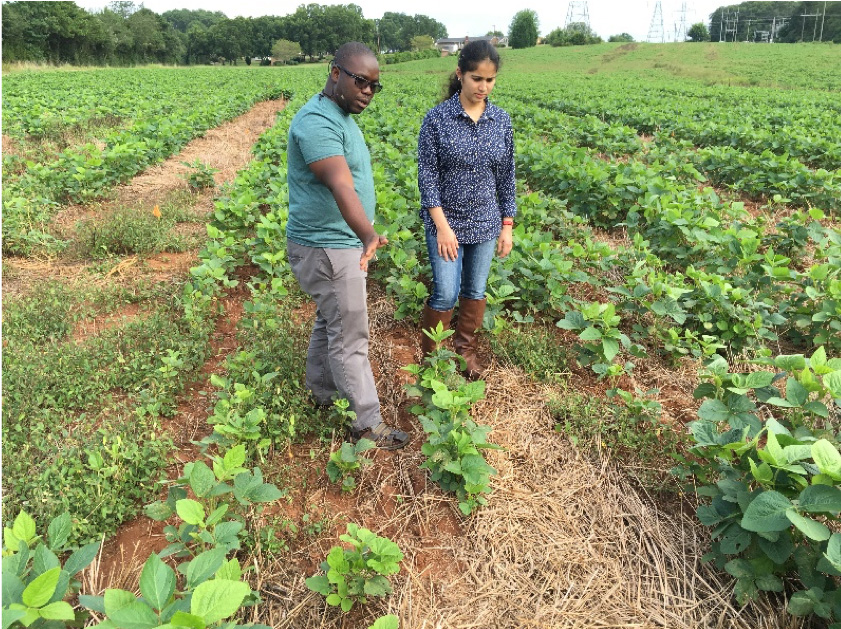CLEMSON – Cover crops have been found to be very resourceful when it comes to enhancing the environment and preserving natural resources, but a Clemson graduate student believes cover crops can do so much more.

Ricardo St. Aime, a master’s student in Plant and Environmental Sciences from Haiti, has received a $16,500 grant from the Southern Sustainable Agriculture Research and Education (SARE) Graduate Student Program to study how cover crops can be used to help retain soil moisture and increase biomass production in fields where grain crops are planted. St. Aime is studying under Sruthi Narayanan, an assistant professor in Clemson’s Plant and Environmental Sciences Department.
“Cover crops are gaining importance as a sustainable practice to use in improving cropping system intensity and diversity, as well as improving soil health and reducing weed pressure,” St. Aime said. “However, few grain producers in the Southeastern United States have included cover crops as part of their cropping systems.”
St. Aime said one reason producers may not include cover crops in their systems is because of a concern that cover crops may reduce the amount of water stored in the soil and not enough water would be available for the next grain crop. This could lead to a reduction in yields.
“During this study, we will evaluate common cover crops used in South Carolina for soil moisture retention and biomass production,” St. Aime said. “These cover crops include grasses, legumes and brassicas. This study will provide information for growers to use in determining which cover crop to use to optimize biomass and soil moisture for subsequent crops.”
Cover crops in the study will be used alone, or in combination with each other. These crops are: rye; crimson clover; a mix of crimson clover and rye; a mix of oat and radish; a mix of crimson clover and turnip; a mix of oats, wheat, crimson clover, radish and turnip; a mix of Austrian winter peas, rye, wheat, crimson clover, and hairy vetch, including grasses, legumes and brassicas.
Cover crops reduce weed pressure and improve soil health and cropping system diversity, but they also use soil water, thus affecting soil water relations of the following cash crop. So, if cover crops are not water-use-efficient, they will result in additional irrigation cost for producers, leading to poor economic viability of cover cropping practices.
“Our proposed project aims at identifying water-use-efficient cover crops and improving the efficiency of utilization of water,” St. Aime said.
- The proposed project will address roadblocks to producer adoption of cover cropping through: Research to identify single species or mixtures of multi-species cover crops that produce large amount of biomass with the use of less amount water,
- Generation of data on water use by cover crops compared with conventional fallow practices, and
- Dissemination of research results to producers, extension agents and other researchers through on-farm demonstration in a workshop, presentations at field days and agricultural meetings, and publication of a journal article.
“We anticipate that the project will result in greater adoption of cover cropping by grain crop producers, reduced use of herbicides and development of soil organic matter leading to healthier soils,” St. Aime said. “In addition, the use of water-use-efficient cover crops will improve the availability of soil water, which could reduce irrigation cost and thus improve the economic feasibility and sustainability of cover cropping practices.”
This project is being conducted at the Millam Farm in Anderson County and will be a part of St. Aime’s doctoral studies, which he will begin in Spring 2019. He said this grant will be very instrumental in helping him with his research and preparing him for a research career on climate-resilient and sustainable agricultural practices to fight hunger, malnutrition and poverty around the world. He is a LASPAU Fulbright Scholar from Haiti and a former National Consultant for Food and Agriculture Organization (FAO), where he led urban agriculture projects that promoted and developed green space in the cities and trained vulnerable families to grow their own food. He is a pioneer in promoting conservation agriculture in Haiti.
St. Aime is working on another cover crop project, was also funded by Southern SARE, in which he is looking at the effect of cover crops on soil nutrient availability and carbon-and-nitrogen-mineralizing-enzymes’ activity. His new research grant will help collect additional data on cover crop effects on soil moisture content during the cover crop season and after termination.
“Together, these studies will produce more comprehensive results on benefits of cover crops in our production systems,” Narayanan said.
The Southern SARE region consists of 13 states, spanning from Texas to Virginia. It also includes Puerto Rico and the U.S. Virgin Islands. St. Aime was one of 18 students selected from 85 applicants to receive this award.
In addition to this grant, St. Aime also is a member of a team that won a seed grant from the Clemson Caribbean Initiative for a study titled, Biofortified Legume and Cereal Cropping Systems to Increase Food Security in Haiti. The focus of this study involves introducing a value-added legume and cereal cropping system approach to combat malnutrition.
-END-
These projects are supported by the Southern Sustainable Agriculture Research and Education (SARE) Graduate Student Program Project GS18-192, Project OS18-118 and Project GS18-192.
Get in touch and we will connect you with the author or another expert.
Or email us at news@clemson.edu

